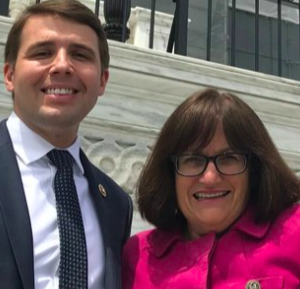Though their votes received little attention from the New Hampshire media, Reps. Annie Kuster and Chris Pappas joined their fellow Democrats in Congress to pass a series of sweeping election laws that would override local control of the election process in ways few Granite Staters likely understand.
Pappas and Kuster both took to the internet to tout their co-sponsorship of H.R. 1, which Democrats call the For the People Act, after it passed the House 220-210 late Wednesday. Not a single Republican voted in favor, while just one Democrat — Bennie Thompson of Mississippi — voted against.
“I was proud to cast my vote today to pass this landmark bill that will strengthen our democracy,” Pappas said in a statement. “By limiting the influence of big money and corporate special interests we can put the power of our democracy back in the hands of the people.”
Kuster called the legislation a “transformational, forward-looking package for the good of our democracy,” adding: “Granite Staters want real accountability from their elected officials. The For the People Act will expand access to the ballot box by breaking down institutional barriers to voting and bolster federal support for voting system security to ensure we are safeguarding every vote.”
But even supporters of H.R. 1 concede that, far from “putting power back in the hands” of Granite Staters, H.R. 1 federalizes the election process, overriding state and local laws.
For example, states like New Hampshire that don’t generally allow mail-in ballots — COVID-19 elections excepted — would lose that right. New Hampshire doesn’t count votes that come in late. “We have one Election Day, not two,” says Secretary of State Bill Gardner. But vote by mail, extended early voting and counting late ballots would all become the law, over the objections of either Gardner or the elected legislature.
On Thursday, the NH state senate voted in favor of requiring additional identification information when voting by absentee ballot. Democrats opposed the measure, Republicans supported it. But if H.R. 1 becomes law, it won’t matter either way. Granite Staters simply won’t be allowed to make these decisions.
And H.R. 1 takes away a state’s right to prohibit “ballot harvesting” — paying campaign workers to go door-to-door, collect ballots and bring them by the boxful to the polling place. New Hampshire law specifies who can be trusted to turn in your ballot (a family member or caregiver) and limits any one person to collecting no more than four ballots.
Those rules, passed by the voters’ representatives in Concord, would be wiped out by Washington, D.C. under H.R. 1.
Which was why 20 attorneys general from across the country sent a letter to congressional leadership declaring the legislation unconstitutional.
“As introduced, the Act betrays several Constitutional deficiencies and alarming mandates that, if passed, would federalize state elections and impose burdensome costs and regulations on state and local officials. Under both the Elections Clause of Article I of the Constitution and the Electors Clause of Article II, States have principal—and with presidential elections, exclusive—responsibility to safeguard the manner of holding elections.”
And, as NHJournal has previously reported, H.R. 1 would give hundreds of millions in public money to politicians and political candidates to fund their campaigns. Axios reported Thursday on “the new grifters” — candidates and committees who raise millions in small-dollar donations challenging high-profile candidates like. Rep. Alexandria Ocasio-Cortez or Sen. Mitch McConnell, with little hope of victory and millions going to consultants and staff.
Under H.R. 1, the millions made by the Lincoln Project-style campaigns would be multiplied by “a scheme of public funds to match small political donations at a 6-to-1 rate,” paid for by the federal treasury. TV attack ads to help keep incumbents like Kuster and Pappas in office would be funded by tax dollars.
In fact, the National Republican Congressional Committee estimates H.R. 1 would be worth an average of $7.2 million in public money to members of Congress who backed it. “House Democrats are once again putting their own self-interest before the American people by funneling over $7 million in public funds to their reelection campaigns, and it will cost them at the ballot box in 2022,” said NRCC Spokeswoman Torunn Sinclair.
The bill also threatens New Hampshire’s First in the Nation status, says state GOP chairman Steve Stepanek.
“H.R. 1 is the basic Democrat blueprint to end the First-In-The-Nation Primary in New Hampshire,” he told NHJournal. “Either they’re naive to this reality, or they don’t care about our FITN primary. Either way, they’re out-of-line and out-of-touch with the Granite State. Every elected official in New Hampshire should be bipartisan in supporting our FITN primary, but Reps. Kuster & Pappas are willing to throw New Hampshire under the bus to keep Nancy Pelosi happy.”
Pappas, who is already being targeted for his support of the bill, is likely to face more opposition as he heads into a tough reelection fight in 2022.
Reps. Pappas and Kuster, who voted for the same bill in 2019, declined repeated requests for comment.




